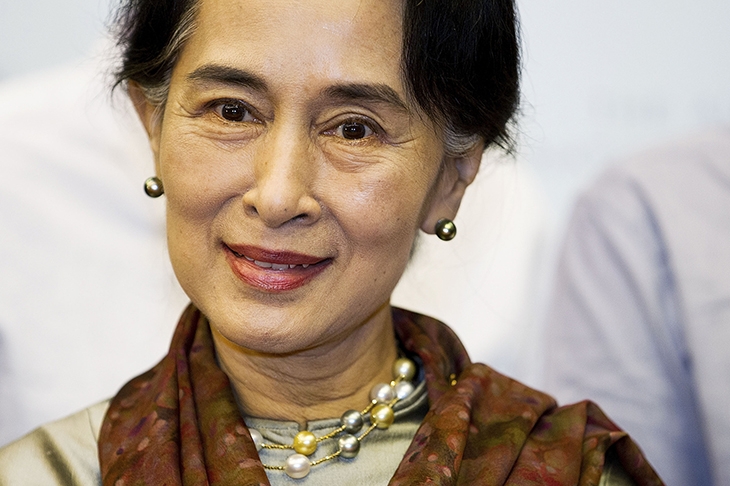My uncle Edward did not like talking about his service in Burma during the second world war. When I asked him what fighting in the jungle was like, his response was brief. ‘Grown men were crying for their mothers,’ he said, and would say no more: the worst combat theatre of that war was not a subject for children. Meanwhile, in India, my grandparents were taking in British refugees from Burma who had little to say either, being sick and traumatised after fleeing the Japanese over high mountain passes during the monsoon.
Before 1939, Burma was one of Asia’s most prosperous countries. Yangon was the second busiest port in the world (after London) and the country the largest rice exporter. But after the war, its cities were mostly destroyed and its economy ruined. The gist of David Eimer’s pessimistic account is that, nearly 75 years on, Burma (as I shall continue to call it) has yet to recover its pre-war prosperity. It’s not a place where time has stood still, as the travel-writing cliché would have it, but one where the clock has run backwards and stopped.
Eimer, formerly the Telegraph’s Asia correspondent, is one of the best travel writers to focus on politics and current affairs. Of course Burma has been in the news in the past few years. Aung San Suu Kyi’s failure to denounce the military for their horrifying persecution of the Rohingya minority has been shocking. As far as the generals are concerned, according to Eimer, the mistreatment of the Rohingya distracts the wider population from the country’s economic failure.
During his researches, he interviewed a large cross-section of Burmese and visited areas normally off-limits, including war zones. The sad reality is that the country has never really seen an end to warfare. After a fleeting hiatus, several civil wars broke out soon after independence in 1948 and have continued to rage to the present.
If global conflict devastated the country through foreign invasion, colonial rule introduced fault lines that undermined it from within. Lacking resources to control the Burmese hinterlands, the Raj had allowed ethnic groups in remoter areas (notably the Karen, Wa, Chin and Shan) to enjoy a more relaxed rule than the majority (the Bamar) in the heartlands. After independence, these minorities baulked at direct government by the Bamar, with the result that 30 ethnic armies and militias are now active in Burma.
One of Eimer’s strangest encounters was with Yawd Serk, head of the Shan State Army, who funds his troops through sales of opium, like a villain in a kung-fu epic. Currently he is in an uneasy alliance with the Burmese army, fighting the TNLA (the militia of the Mon-Khmer Ta’ang people). None of the rebel troops Eimer spoke to expressed confidence in Aung Sang Suu Kyi’s efforts to re-open peace talks.
The generals and the rebel groups alike depend for funds on jade-smuggling and drugs. Burma is one of the most corrupt nations on Earth; only Iraq and Libya see more black-market trade. Since Aung San Suu Kyi and her NLD party won the 2015 elections, little has improved for the ordinary people. The generals have manipulated the new constitution so as to control a quarter of the seats in parliament and can block further reforms. As Eimer puts it, they are the country’s back-seat drivers, and its wealth remains with them and their cronies. The rest wear flip-flops: shoes and trainers are luxuries.
Racism and greed are exacerbated by superstition. Eimer reminds us of the behaviour of Ne Win, the country’s principal ruler after the coup in 1962, who was rumoured, for health reasons, to bathe in dolphins’ blood. To this day, astrology remains an obsession for the Burmese. It was a fortune-teller’s advice that was behind the pointless decision in 2005 to relocate the capital from Yangon to Naypyidaw, a city built from scratch in a remote rural area. Eimer finds it strangely quiet and empty — unsurprisingly, since large parts of it are out of bounds to ordinary Burmese.
One aspect of the country today that Eimer surprisingly doesn’t discuss is tourism — which in fact has grown into a major industry. Burma has finally ended the silence that has shrouded it for so long. During my trips there I’ve found the people to be some of the friendliest in the Indian subcontinent, not least because they are getting used to visitors again. Even if the generals swipe most of tourism’s revenues, increasing contact with the outside world is beginning to raise local aspirations and fuel pressure for reform. In the meantime, Eimer’s wide-ranging portrait of a country in straits as dire as they’re prolonged is both fascinating and troubling.






Comments